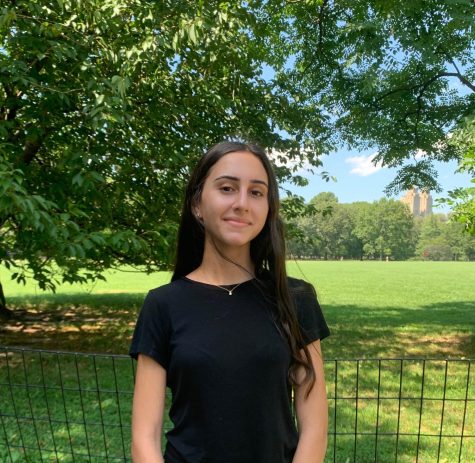College Night Recap: What Every Junior Needs to Know
Fall college night for the parents and students of the Class of 2021 took place on November 20, 2019. Following a half hour of food and drinks, everyone sat to hear tips from the four members of the College Guidance Office: Ms. Dana Messinger, Mr. Rafael Blumenthal, Dr. Edith Honig, and Ms. Abby Davis. In addition, a question and answer session was held with a panel of five representatives from college admissions’ offices. The panel was conducted in a question and answer format, with the questions posed by the members of the Ramaz College Guidance Office and answers provided by the college representatives. Overall, the evening was considered to be very useful and well run, and was appreciated by both students and parents alike.
The evening discussion began with an introduction by Rabbi Stochel about the importance of a year in Israel after graduation. He stated that Ramaz is “really a five year high school” with the fifth year being the year in Israel. He explained that the Israel year is not a gap year, but a capstone and a stepping stone that reinforces the values with which our students have been raised and firms up these values to prepare the students for life on a college campus. Rabbi Stochel mentioned that the students will soon meet with one of the four Israel advisors in addition to the college advisors. He also added that in choosing a college, Ramaz students should consider one that has a positive influence on every student’s spiritual growth.
Next, the parents and students heard from Ms. Dana Messinger, Dean of College Guidance. She explained that even though each student has been assigned an adviser, the guidance office serves as a team and are all there to help. She said that now is the right time to think about a summer activity for this year and mentioned the spring college night when representatives from many colleges will be visiting Ramaz.
Dr. Edith Honig, Associate Director of College Guidance clarified the roles of the students, parents and advisors in the college application process. The student is in the “driver’s seat,” but parents should also play a role and help to define boundaries, including geography, financial considerations, and Jewish life on campus. Parents know their kids best and know how much involvement is needed. Advisors are here to help and find the proper fit for each student and are accessible in person as well as by email and phone.
Ms. Abby Davis, Associate Director of College Guidance explained that students have already started to meet with their advisors. She recommended that students start thinking about which teachers will write their letters of recommendation and start to reinforce certain relationships. Junior-year teachers are often asked to write these letters, so students should keep this in mind.
Mr. Rafael Blumenthal, Director of College Guidance, discussed how to research colleges and some of the factors to consider. He described the various resources available both from the colleges and from Ramaz. He highly recommended speaking with Ramaz alumni and other students with similar interests, and stressed the importance of visiting campuses to get a feel for the environment. He also recommended speaking with college representatives.
Mr. Blumenthal then introduced the panel of college representatives: Byron Gittens from Binghamton University (SUNY), Rachel Taylor from Columbia University, Marianne Boofall-Tyran from Macaulay Honors College (CUNY), Jonathan Williams from New York University, and Marc Zharnest from Yeshiva University.
The first question raised was advice for parents who are going through the admissions process for the first time. The collective opinion from the college representatives was to relax because you will “get through it.” Parents need to listen to their children and the children need to listen to their parents. It’s important to visit schools, go to informational sessions, do your research, and trust the experts.
With regard to support for Orthodox students on campus, all the representatives discussed an abundance of support on their campuses. Of course, the representative from Yeshiva University depicted the greatest support for Jews and pointed out that YU “proudly flies the Israeli flag 365 days a year,” is closed for all Jewish holidays, and offers only Kosher food. The crowd applauded.
The next topic concerned summer plans. The overall opinion is that there is not one answer. Each student should pursue what he or she enjoys, whether it be sports, research, or an internship, for example, as colleges view all of them positively, demonstrating promise as a well-rounded student.
When asked about advice for the juniors, college representatives recommended becoming involved in one’s community. The representatives further stressed that visits to college campuses are important, and the sooner the better. They suggested looking around the neighborhood, visiting the Hillel, and getting a feel for the general “climate” on campus. College representatives stressed that they take a holistic approach to viewing a student. Colleges look at how the student has taken advantage of what has been offered to him or her. Colleges look at the grades obtained throughout high school but certainly want to see an upward trend. If there is a decrease in one’s academic performance, and there is an important reason for it, then it is best to explain that in the application.
With regard to subject tests, many colleges don’t require them. It’s important to see what each college requests and provide that. It slows down the application process to send a college material that the school did not request and doesn’t want. Many colleges superscore the ACT, while at some, just the honors program does. It seems colleges are not yet certain how this policy will be affected by the fact that one can now sit for only math or only English each time one takes the ACT.
Regarding early decision/early action, the colleges stated that it is helpful for the student to finish the process earlier. The Binghamton representative said that he looks at applicants on a first come, first serve basis, whereas the Columbia representative said that early applicants are not viewed more positively than regular applicants. The representatives said that the financial aid that students receive is not affected by whether or not they apply early. Most stated that admissions is need-blind.
Teacher recommendations should, most importantly, come from teachers who like you. Some colleges prefer a teacher from a subject in which you want to major, or a teacher from later on in high school. But others just recommend a teacher who will say nice things about you. Colleges want a teacher who will tell them what kind of citizen the student will be on campus. Colleges do not want a personal letter of recommendation from someone outside of school.
When asked if schools have a quota for taking students from a certain school, all representatives agreed that quotas are illegal and, as such, no quotas exist.
When it comes to the essay, colleges want to hear the voice of the student. If one is not a funny person, don’t try to make jokes. Also, colleges are not looking for emotional stories. They can tell the difference between genuine and contrived. Topics for the essay should be appropriate, ones that students would feel comfortable discussing with their bosses or publishing in a newspaper. Any topic that is overly private and inappropriate to be shared in a newspaper does not have a place in the essay. Also, the representatives agreed that a student’s writing improves as one moves through high school, so one should wait until later in the year to write the essay.
The representatives had some parting words of advice for students and parents. Students were told to “do a temperature check” and be honest about how they are feeling during the process. Stressed students should tell their parents and maybe take a break. Parents were reminded that their positive experiences at certain schools does not mean that their children will have the same experience.
At the end of the panel, the students and parents applauded the college representatives, a sign that the audience found the college reps to be very informative and helpful. The Ramaz College Office informed parents that parent meetings with the Ramaz college advisors will begin once the student meetings have finished.
Overall, Fall College Night was a positive experience for both parents and students, but it did add a slight dosage of reality to the lives of the juniors. Sophia Ratzker ’21 stated, “The college meeting and learning about the whole process made college feel so real. But, it was still very helpful.”
Michele Spielfogel, a Ramaz parent who is new to the college admissions process, commented, “I found the evening very informative for someone who knows nothing about the process. The answers provided information that maybe you heard differently from people. Some say junior year matters more, but the representatives said otherwise.”
Ramaz parent Dana Hiltzik, former president of the Ramaz Parents Council (and future honoree at the Ramaz dinner on February 23rd) stated, “I thought the questions asked and answers provided by the panelists provided important insight into such admission topics as early decision/early action, essay/personal statement writing and Jewish life on campus.’
Hopefully, the college admission process will continue to be a successful one for all Ramaz juniors. The parents and students alike are grateful to the college representatives who came to speak and for the college guidance officers who put together a well-organized event. It is reassuring to know that the Ramaz college guidance advisors are eager to help guide students throughout the entire college admissions process.

Caitlin Levine loves journalism, is an avid writer, and is thrilled to be an editor-in-chief of The Rampage. Caitlin has actively contributed to The Rampage...



